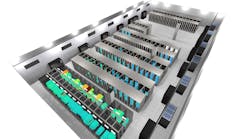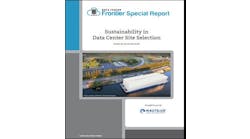There was lots of good news for Equinix iduring earnings season, as the company touted its 66th consecutive quarter of revenue growth. There was also a development that got less notice among the discussion of bookings and trends.
In early July Equinix announced that Fitch Ratings upgraded all of its ratings to investment grade, reflecting the strength of the company’s business and balance sheet. This was Equinix’s second investment grade rating, following S&P Global Ratings’ upgrade in February. With the second upgrade, Equinix is now officially an investment grade company, joining Digital Realty as the only public data center providers to meet the standard.
While credit ratings may not seem sexy, an investment grade rating allows companies to borrow money at more attractive rates. In a capital-intensive business like the data center sector, lower borrowing costs make it cheaper to build data centers and growth your business.
“Reaching this milestone ensures that we have market access to a deeper pool of investors at a lower cost of capital and provides a greater set of immunity to the macroeconomic environment we now operate in,” said Equinix Chief Financial Officer Keith Taylor. “We also expect to drive substantial interest rate savings into the business over the next few years, both as we refinance our current outstanding debt load and as we borrow new incremental funds to invest in our future growth initiatives.”
Equinix said the investment grade rating will also triggering the automatic removal of covenants from some of its existing senior notes. It should provide a competitive boost for Equinix, which has built a global data center empire, becoming a lynchpin of the Internet and digital business. With 200 data centers and 21 million square feet of space deployed across 52 markets, Equinix is a colocation colossus.
The upgrade was expected, but was years in the making. It arrives in an increasingly competitive environment, with new investors and providers entering the business. Cost of capital has become a differentiator, allowing companies that have low borrowing costs to build new capacity at a lower cost. This gives providers the opportunity to earn better returns than rivals with higher borrowing costs, or adjust their pricing to win more deals.
Why Capital Matters
Some of the world’s largest investors are raising billions of dollars to invest in digital infrastructure, citing extraordinary demand for capital to fuel the data economy. Infrastructure funds and sovereign wealth funds are becoming more active in the sector, creating new companies and investing in data center construction.
Equinix has built a global data center empire, becoming a lynchpin of the Internet and digital business. With 200 data centers and 21 million square feet of space deployed across 52 markets, Equinix is a colocation colossus.
Digital Realty earned its investment grade rating in 2010, with current CEO Bill Stein calling it an “inflection point” for the growing company. “Access to the investment grade unsecured debt market gives us a significant competitive advantage,” said Stein, who was CFO at the time.
“Reaching this milestone ensures that we have market access to a deeper pool of investors at a lower cost of capital.”
Equinix CFO Keith Taylor
Digital Realty and Equinix may soon have company. A third large real investment trust, CyrusOne, has also been positioning itself to reach investment grade.
“We’re already there with S&P,” CyrusOne CFO Diane Morefield noted in last week’s earnings call. “We would anticipate Moody’s reviewing us at some point this year, and we’ve got conversations with Fitch. We’re pretty transparent in the benchmarking that we feel we’re already at investment grade. It’s just a slow process to get there formally.”
“It was good to see Equinix finally get there,” added Gary Wojtaszek, President and CEO of CyrusOne. Since they now are there with all the rating agencies, that just provides a little more comfort to their comfort to this industry. So hopefully, we get some positive benefit as a result of that. Once you hit investment grade, your access to capital opens up dramatically.”






